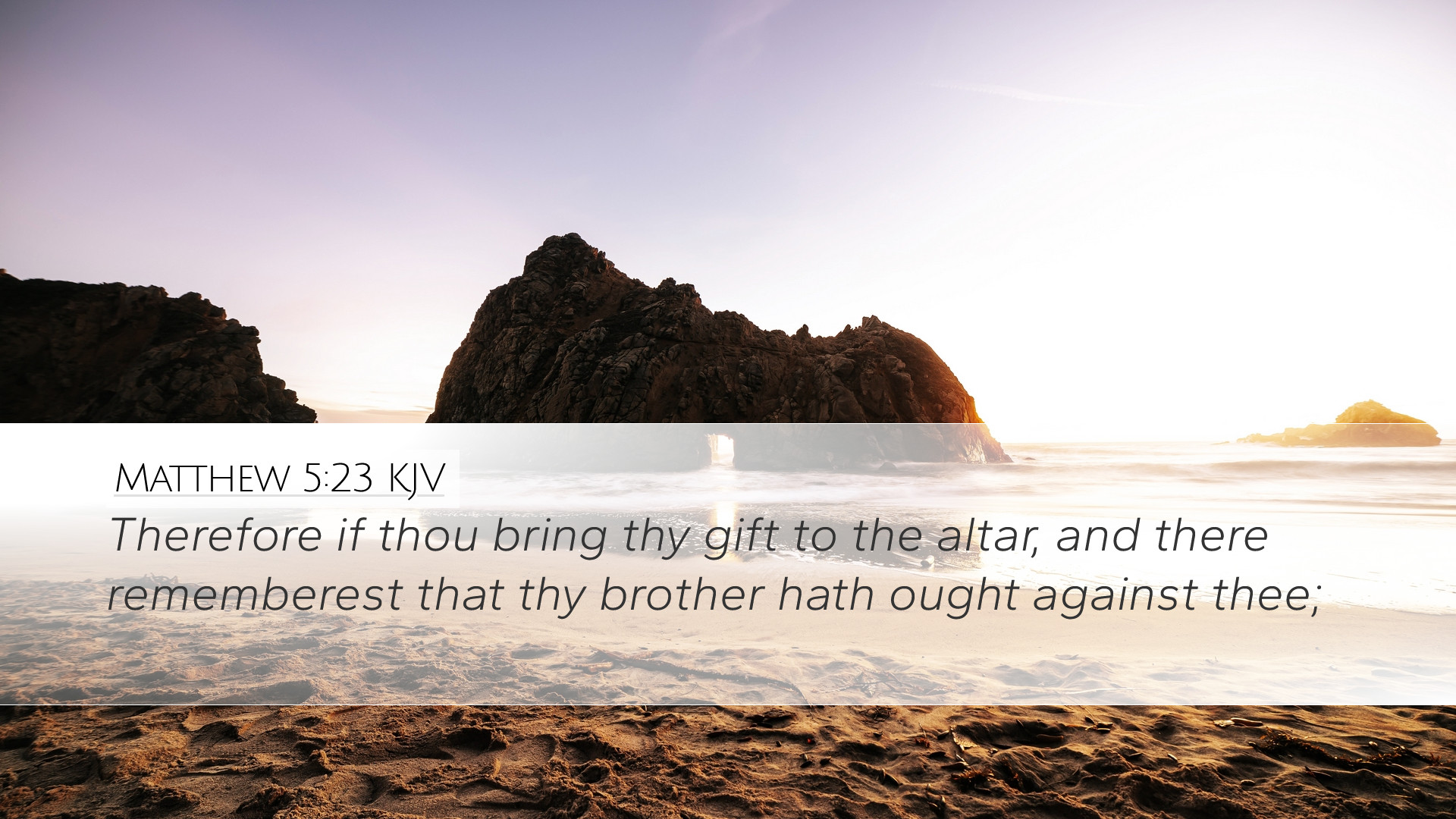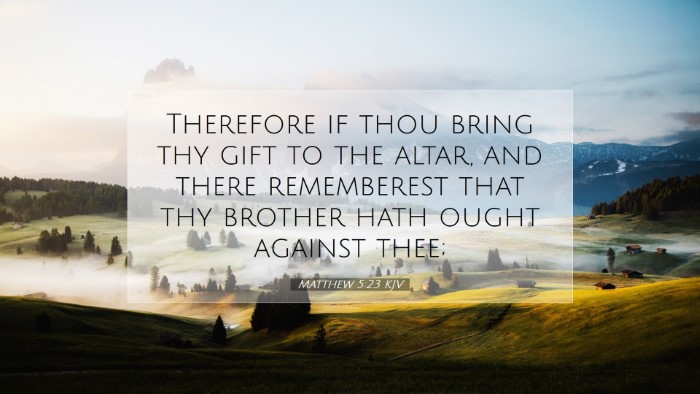Commentary on Matthew 5:23
Verse: "Therefore if thou bring thy gift to the altar, and there rememberest that thy brother hath ought against thee."
Introduction
The Sermon on the Mount encapsulates the essence of Jesus’ teachings, emphasizing the spirit of the law over mere external compliance. Matthew 5:23 serves as a pivotal verse in understanding the relational aspect of worship and the importance of reconciliation.
Contextual Analysis
This verse is set within a broader discourse on the law, where Jesus challenges the Jewish understanding of righteousness. He encourages introspection and emphasizes that genuine worship must be accompanied by a pure heart and harmonious relationships.
Matthew Henry's Commentary
According to Matthew Henry, this verse illustrates the necessity of addressing grievances with one’s brother before engaging in acts of worship. He underscores that the altar represents a place of communion with God, and thus, reconciliation should precede offerings. Henry expresses that it is an affront to God to approach Him with a gift while harboring unresolved conflict with others. He advises that true worship is not merely about fulfilling religious obligations but about maintaining right relationships.
Albert Barnes' Insights
Albert Barnes elaborates on the implications of this verse, emphasizing that the mention of "the altar" denotes the heart of worship for the Jewish people. Barnes suggests that Jesus places significant importance on community relationships and stresses that one cannot be truly right with God if he is not right with his brethren. He notes that the term "brother" is inclusive of all believers, and thus, the command to seek reconciliation extends beyond mere acquaintances. Furthermore, Barnes points out that the act of remembering suggests personal responsibility; one must actively seek to restore harmony when aware of discord.
Adam Clarke's Interpretation
Adam Clarke offers a thorough interpretation that emphasizes the serious nature of the command. He notes that the idea of bringing a gift to the altar symbolizes a sincere act of worship. Clarke highlights that Jesus directs attention to the internal attitudes that accompany worship—indicating that even while engaged in religious duties, the worshiper should prioritize mending relationships. During Clarke's analysis, he contemplates the revolutionary nature of this teaching for the Jewish audience who held ritual purity in high regard. He emphasizes that spiritual duties cannot compensate for neglecting moral obligations.
Theological Implications
The verse presents significant theological implications about the nature of God and the expectations of worship. It highlights a God who values human relationships as integral to the worship experience. This leads to a realization that reconciliation with one another directly influences our relationship with God. The verse serves as a reminder that love for God cannot be separated from love for others.
Relational Theology
The relational theology proposed in this verse implies that one’s worship is only accepted if it's accompanied by an active pursuit of peace with others. The Greek term used for "gift" (δῶρον) indicates something offered voluntarily, suggesting that God desires our worship to stem from sincere motives rather than mere obligation.
Practical Application for Believers
-
Prioritize Reconciliation: Whenever believers approach God in prayer or worship, they should examine their relationships and strive to resolve any conflicts.
-
Seek Accountability: Individuals may find value in fostering community practices that promote openness and reconciling discussions, reinforcing the communal aspect of faith.
-
Encourage Forgiveness: The church should embody a culture of forgiveness, recognizing that harboring grievances can hinder spiritual growth and community harmony.
Conclusion
In Matthew 5:23, Jesus presents a radical call to worship that prioritizes reconciliation and relational integrity. Drawing from the insights of Matthew Henry, Albert Barnes, and Adam Clarke, it is evident that the verse invites believers to reflect on their interpersonal relationships and encourages a deeper connection with God that is manifested through unity and peace among brethren. This exhortation serves as an enduring principle for pastors, theologians, and scholars as they seek to cultivate a worship environment that genuinely honors God and uplifts the community.


